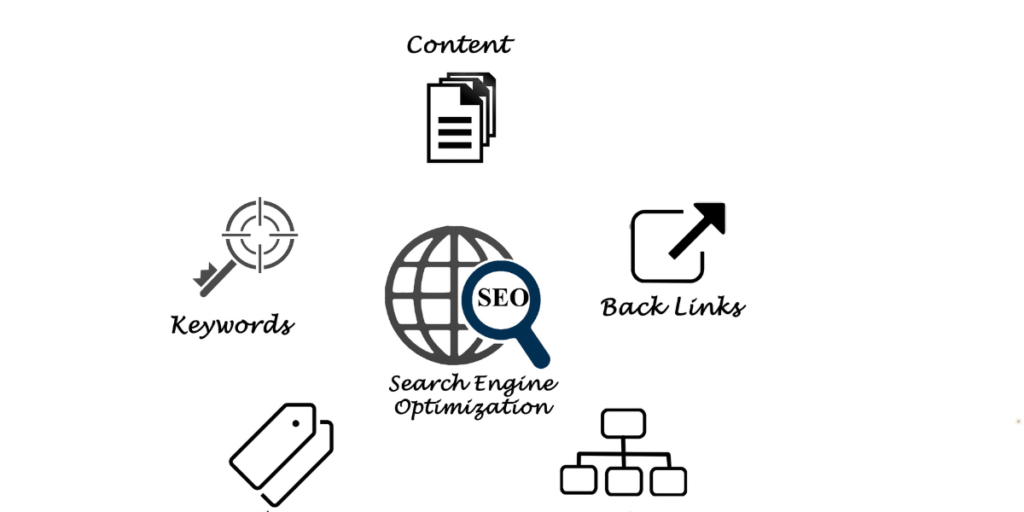
At Finest Seo Agency, we understand that having a well-optimized website is crucial for the success of any online business. In today’s fast-paced digital world, where competition is fierce, it’s essential to stay ahead of the game by ensuring your website ranks high in search engine results pages (SERPs). That’s why we’ve put together this comprehensive guide of 10 proven strategies that will help skyrocket your website’s SEO in 2023.
1. Conduct Keyword Research

Keyword research is the foundation of any successful SEO campaign. Before you begin optimizing your website, you need to identify the keywords and phrases that your target audience is searching for. Use tools like Google Keyword Planner, Ahrefs, or SEMrush to find the most relevant keywords and phrases for your business. It’s essential to choose keywords that have a high search volume and low competition.
Conducting thorough keyword research is one of the most important steps in optimizing your website for search engines. Keyword research helps you understand what phrases and terms your target audience is searching for, and allows you to create content that matches their needs.
To start your keyword research, brainstorm a list of topics related to your business or industry. Then, use keyword research tools such as Google Keyword Planner, Ahrefs, or SEMrush to find related keywords and phrases with high search volume and low competition.
When selecting keywords, it’s important to consider the intent behind the search. Are users looking for information, products, or services? By understanding the intent behind the search, you can create content that matches their needs and provides value.
Once you’ve selected your keywords, incorporate them into your website’s content, including page titles, headings, and meta descriptions. However, be careful not to overuse keywords or engage in keyword stuffing, as this can harm your website’s SEO.
By conducting keyword research and incorporating targeted keywords into your content, you can improve your website’s relevance and increase your chances of ranking higher in search engine results pages.
2. Optimize Your Website’s Content

Creating high-quality content that’s optimized for search engines is crucial for improving your website’s SEO. Start by incorporating your target keywords naturally into your content. Ensure your content is easy to read and provides value to your readers. Use headings, subheadings, and bullet points to break up your content and make it easier to scan.
Optimizing your website’s content is a critical step in improving your website’s SEO. By creating high-quality, valuable content that aligns with your target audience’s needs and interests, you can improve your website’s relevance and authority in search engine results pages.
Here are some tips for optimizing your website’s content:
- Focus on creating unique, high-quality content that offers value to your audience. Avoid duplicating content or using content that has been copied from other websites.
- Incorporate your targeted keywords naturally into your content, including page titles, headings, meta descriptions, and body content.
- Use descriptive and engaging headings and subheadings to break up your content and make it easier to read. This also helps search engines understand the structure and organization of your content.
- Optimize your images by using descriptive file names and alt tags that include your targeted keywords.
- Use internal linking to connect related pages and content on your website. This helps search engines understand the relationship between your pages and improves the overall user experience.
- Ensure your website’s content is mobile-friendly and optimized for different screen sizes and devices.
Remember, when it comes to optimizing your website’s content, quality is more important than quantity. Focus on creating valuable, high-quality content that meets the needs of your target audience, and you’ll be on your way to improving your website’s SEO.
3. Improve Your Website’s Load Time

Website speed is a crucial ranking factor, and slow-loading websites can negatively impact user experience. Use tools like Google PageSpeed Insights or GTmetrix to analyze your website’s speed and identify any issues that need to be addressed. Optimize your images, reduce server response time, and minify CSS and JavaScript files to improve your website’s load time.
Improving your website’s load time is a critical aspect of SEO, as it can impact both user experience and search engine rankings. If your website takes too long to load, visitors may become frustrated and leave your site, leading to a higher bounce rate and lower engagement metrics.
Here are some tips for improving your website’s load time:
- Optimize your images by compressing them without sacrificing quality. Large image files can significantly slow down your website’s load time.
- Minimize the use of scripts and plugins on your website, as they can add extra weight and slow down your website’s load time. Remove any unnecessary scripts or plugins and consider combining multiple scripts into one file.
- Use a content delivery network (CDN) to distribute your website’s content across multiple servers, reducing the load time for visitors in different locations.
- Enable browser caching, which allows visitors to store website files on their computer, reducing load time for subsequent visits.
- Use a reliable web hosting provider and ensure that your website’s hosting package can handle the traffic and bandwidth required for your website.
- Consider using a website optimization tool, such as Google’s PageSpeed Insights, to identify areas of your website that can be optimized for faster load times.
Remember, a faster website not only improves user experience but can also positively impact your search engine rankings. By following these tips and continuously monitoring your website’s load time, you can ensure that your website is optimized for both users and search engines.
4. Build High-Quality Backlinks

Backlinks from reputable websites are a crucial ranking factor for search engines. Focus on building high-quality backlinks from websites that are relevant to your niche. Use tactics like guest blogging, broken link building, and outreach to earn backlinks naturally.
Building high-quality backlinks is an essential aspect of SEO that can significantly impact your website’s search engine rankings. Backlinks are links from other websites that point to your website, indicating to search engines that other sites consider your content valuable and relevant.
Here are some tips for building high-quality backlinks:
- Focus on creating high-quality, valuable content that other websites will want to link to. When you produce high-quality content, other websites will naturally want to link back to your site.
- Reach out to other websites in your industry and ask if they would be willing to link to your content. This can be done through email outreach, social media, or other channels.
- Participate in online communities and forums related to your industry and share your content. If your content is valuable and relevant, other members of the community may link to your site.
- Guest post on other websites in your industry, providing valuable content and including a link back to your site.
- Use social media to promote your content and encourage others to share it. The more people that see your content, the more likely it is that other websites will link to it.
Remember, when building backlinks, quality is more important than quantity. Focus on building high-quality backlinks from reputable websites in your industry, and avoid using spammy tactics such as buying links or participating in link farms. By building high-quality backlinks, you can improve your website’s authority and relevance in search engine results pages.
5. Improve Your Website’s User Experience

User experience (UX) is a crucial factor in determining how long users stay on your website and how likely they are to convert. Ensure your website is easy to navigate, has a clear call to action, and is optimized for mobile devices. Improving your website’s user experience (UX) is an essential aspect of SEO that can significantly impact your website’s search engine rankings. User experience refers to how users interact with your website, including factors such as ease of use, accessibility, and visual appeal.
Here are some tips for improving your website’s user experience:
- Simplify your website’s navigation and make it easy for users to find what they are looking for. Use clear labels and organize your content logically.
- Ensure that your website is accessible to all users, including those with disabilities. This includes using alt tags for images, providing captions for videos, and ensuring that your website is compatible with assistive technologies.
- Use clear, easy-to-read fonts and a color scheme that is easy on the eyes. Avoid using too many colors or fonts, which can make your website appear cluttered and difficult to read.
- Optimize your website for mobile devices, as an increasing number of users access the internet from their phones and tablets. Ensure that your website is responsive and loads quickly on mobile devices.
- Include high-quality, relevant images and videos to make your content more engaging and visually appealing.
- Make it easy for users to interact with your website, such as by including social media sharing buttons or contact forms.
By improving your website’s user experience, you can not only improve engagement and conversions but also positively impact your search engine rankings. Search engines prioritize websites that provide a positive user experience, so by following these tips and continuously monitoring your website’s UX, you can ensure that your website is optimized for both users and search engines.
6. Optimize Your Website’s Meta Tags

Meta tags are the snippets of text that appear in search engine results pages (SERPs). Optimizing your meta tags can help improve your click-through rate (CTR) and attract more traffic to your website. Ensure your meta title and description accurately reflect the content on your page and incorporate your target keywords.
Optimizing your website’s meta tags is an important aspect of SEO that can help improve your website’s search engine rankings. Meta tags are snippets of code that provide information about your website to search engines and website visitors.
Here are some tips for optimizing your website’s meta tags:
- Title Tag: The title tag is one of the most important meta tags and should accurately describe the content of the page. It should be brief, ideally 50-60 characters, and include your primary keyword.
- Meta Description: The meta description provides a brief summary of the page’s content and should be around 155-160 characters. It should include your primary keyword and be written in an engaging way to encourage users to click through to your website.
- Header Tags: Header tags (H1, H2, H3, etc.) are used to structure the content of your page and make it easier for users and search engines to understand. The H1 tag should be used for the main title of the page and include your primary keyword.
- Image Alt Tags: Alt tags are used to describe images to search engines and website visitors who are visually impaired. They should be descriptive and include your primary keyword.
- Canonical Tags: Canonical tags are used to indicate the preferred version of a webpage when multiple versions exist. This can help prevent duplicate content issues and improve search engine rankings.
- Robots Meta Tag: The robots meta tag is used to tell search engines which pages to index and which pages to exclude. It can also be used to indicate that a page should be crawled but not indexed.
By optimizing your website’s meta tags, you can provide more accurate information to search engines and improve the chances of your website appearing in relevant search results. However, it’s important to avoid keyword stuffing and focus on providing accurate and relevant information to both search engines and website visitors.
7. Use Social Media to Promote Your Website

Social media is an excellent way to promote your website and attract more traffic. Use platforms like Facebook, Twitter, and LinkedIn to share your content, engage with your audience, and build your brand.
Optimizing your website’s meta tags is an important aspect of SEO that can help improve your website’s search engine rankings. Meta tags are snippets of code that provide information about your website to search engines and website visitors.
Here are some tips for optimizing your website’s meta tags:
- Title Tag: The title tag is one of the most important meta tags and should accurately describe the content of the page. It should be brief, ideally 50-60 characters, and include your primary keyword.
- Meta Description: The meta description provides a brief summary of the page’s content and should be around 155-160 characters. It should include your primary keyword and be written in an engaging way to encourage users to click through to your website.
- Header Tags: Header tags (H1, H2, H3, etc.) are used to structure the content of your page and make it easier for users and search engines to understand. The H1 tag should be used for the main title of the page and include your primary keyword.
- Image Alt Tags: Alt tags are used to describe images to search engines and website visitors who are visually impaired. They should be descriptive and include your primary keyword.
- Canonical Tags: Canonical tags are used to indicate the preferred version of a webpage when multiple versions exist. This can help prevent duplicate content issues and improve search engine rankings.
- Robots Meta Tag: The robots meta tag is used to tell search engines which pages to index and which pages to exclude. It can also be used to indicate that a page should be crawled but not indexed.
By optimizing your website’s meta tags, you can provide more accurate information to search engines and improve the chances of your website appearing in relevant search results. However, it’s important to avoid keyword stuffing and focus on providing accurate and relevant information to both search engines and website visitors.
8. Monitor Your Website’s Analytics

Monitoring your website’s analytics is crucial for understanding how users interact with your website and identifying areas for improvement. Use tools like Google Analytics to track your website’s traffic, user behavior, and conversions.
Using social media to promote your website can be an effective way to increase your website’s visibility and drive traffic to your site. Social media platforms like Facebook, Twitter, LinkedIn, and Instagram can be used to share content, engage with your audience, and attract new visitors to your website.
Here are some tips for using social media to promote your website:
- Share your content: Share links to your blog posts, articles, and other content on your social media channels. Make sure to use eye-catching images and include relevant hashtags to make your content more discoverable.
- Engage with your audience: Respond to comments, answer questions, and engage with your followers on social media. This can help build relationships and increase brand awareness.
- Run promotions and contests: Running promotions and contests on social media can help increase engagement and drive traffic to your website. Make sure to follow the platform’s guidelines and rules when running promotions.
- Leverage influencers: Partnering with influencers in your industry can help increase your reach and drive traffic to your website. Look for influencers who have a large following and are relevant to your industry.
- Use paid advertising: Social media platforms offer a variety of advertising options, including sponsored posts and targeted ads. Using paid advertising can help increase your visibility and drive traffic to your website.
By using social media to promote your website, you can increase your online presence and reach new audiences. However, it’s important to choose the right platforms for your business and focus on creating engaging content that resonates with your audience.
9. Optimize Your Website for Local Search

If you have a physical location, optimizing your website for local search is essential. Ensure your website includes your business name, address, and phone number (NAP) and is listed on Google My Business.
Optimizing your website for local search is an important aspect of improving your website’s SEO, especially if you have a business that serves a specific geographic area. Local SEO involves optimizing your website’s content and meta tags to appear in search results for local queries, such as “restaurants near me” or “plumbers in [Kolkata]”.
Here are some tips for optimizing your website for local search:
- Claim your Google My Business listing: Google My Business is a free tool that allows you to manage your business’s online presence across Google, including in search results and Google Maps. Claiming your listing and optimizing it with accurate business information, photos, and reviews can help your business appear in local search results.
- Include location-based keywords: Include location-based keywords throughout your website’s content and meta tags, such as in your page titles, headings, and meta descriptions. This can help your website rank higher in local search results for relevant queries.
- Create location-specific landing pages: If you serve multiple locations, consider creating location-specific landing pages for each area you serve. These pages can include information about your services in that area, customer testimonials, and local keywords.
- Get listed in local directories: Getting listed in local directories, such as Yelp, TripAdvisor, and Yellow Pages, can help your business appear in local search results and improve your online reputation.
- Encourage customer reviews: Encourage your customers to leave reviews on your Google My Business listing and other review sites. Positive reviews can improve your business’s visibility in local search results and help attract new customers.
By optimizing your website for local search, you can improve your visibility in local search results and attract more customers to your business.
10. Stay Up-to-Date with SEO Trends

SEO is an ever-evolving field, and it’s essential to stay up-to-date with the latest trends and best practices. Follow industry blogs, attend conferences, and network with other SEO professionals to stay ahead of the curve.
Staying up-to-date with SEO trends is crucial to the long-term success of your website’s SEO strategy. Search engine algorithms are constantly evolving, and what worked well in the past may not be effective today.
Here are some ways to stay up-to-date with SEO trends:
- Follow industry experts: Follow SEO industry experts and influencers on social media, blogs, and podcasts. These experts often share the latest SEO news, trends, and strategies.
- Read SEO blogs and publications: Read reputable SEO blogs and publications, such as Search Engine Journal, Moz, and Search Engine Land, to stay informed about the latest trends and best practices in SEO.
- Attend SEO conferences: Attend SEO conferences and workshops to learn from industry experts and network with other SEO professionals. These events offer valuable insights into the latest trends and strategies in SEO.
- Participate in online communities: Participate in online communities, such as forums and social media groups, where SEO professionals share information and discuss the latest trends and strategies.
- Analyze your website’s performance: Regularly analyze your website’s performance using tools such as Google Analytics and Google Search Console. This can help you identify areas for improvement and stay up-to-date with the latest SEO trends and best practices.
By staying up-to-date with the latest SEO trends and best practices, you can ensure that your website’s SEO strategy remains effective and competitive in the ever-changing digital landscape.
Conclusion

- Implementing these 10 proven strategies will help improve your website’s
SEO and increase your website’s visibility in search engine results pages (SERPs). Remember, SEO is a long-term strategy that requires patience and dedication. By following these tactics and staying up-to-date with the latest trends, you can achieve long-term success and outrank your competitors in 2023 and beyond.
- We hope you found this guide helpful. If you need assistance with optimizing your website for search engines, Finest Seo Agency is here to help. Contact us today to learn how we can improve your website’s SEO and increase your online visibility.

